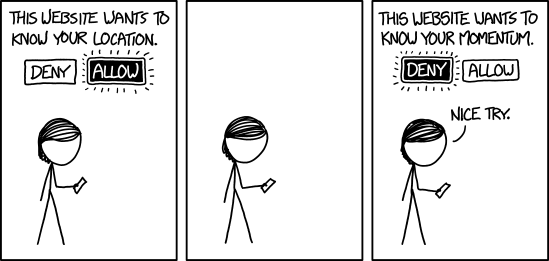Sean Carroll has a
guest post by Chip Sebens on the
Many-Interacting-Worlds Approach to Quantum Mechanics. Here's the first part of it.
---
"In Newtonian physics objects always have definite locations. They are never in two places at once. To determine how an object will move one simply needs to add up the various forces acting on it and from these calculate the object’s acceleration. This framework is generally taken to be inadequate for explaining the quantum behavior of subatomic particles like electrons and protons. We are told that quantum theory requires us to revise this classical picture of the world, but what picture of reality is supposed to take its place is unclear. There is little consensus on many foundational questions: Is quantum randomness fundamental or a result of our ignorance? Do electrons have well-defined properties before measurement? Is the Schrödinger equation always obeyed? Are there parallel universes?
"Some of us feel that the theory is understood well enough to be getting on with. Even though we might not know what electrons are up to when no one is looking, we know how to apply the theory to make predictions for the results of experiments. Much progress has been made―observe the wonder of the standard model―without answering these foundational questions. Perhaps one day with insight gained from new physics we can return to these basic questions. I will call those with such a mindset the doers. Richard Feynman was a doer:
“It will be difficult. But the difficulty really is psychological and exists in the perpetual torment that results from your saying to yourself, ‘But how can it be like that?’ which is a reflection of uncontrolled but utterly vain desire to see it in terms of something familiar. I will not describe it in terms of an analogy with something familiar; I will simply describe it. … I think I can safely say that nobody understands quantum mechanics. … Do not keep saying to yourself, if you can possibly avoid it, ‘But how can it be like that?’ because you will get ‘down the drain’, into a blind alley from which nobody has yet escaped. Nobody knows how it can be like that.”
-Feynman, The Character of Physical Law (chapter 6, pg. 129)
"In contrast to the doers, there are the dreamers. Dreamers, although they may often use the theory without worrying about its foundations, are unsatisfied with standard presentations of quantum mechanics. They want to know “how it can be like that” and have offered a variety of alternative ways of filling in the details. Doers denigrate the dreamers for being unproductive, getting lost “down the drain.” Dreamers criticize the doers for giving up on one of the central goals of physics, understanding nature, to focus exclusively on another, controlling it. But even by the lights of the doer’s primary mission―being able to make accurate predictions for a wide variety of experiments―there are reasons to dream:
“Suppose you have two theories, A and B, which look completely different psychologically, with different ideas in them and so on, but that all consequences that are computed from each are exactly the same, and both agree with experiment. … how are we going to decide which one is right? There is no way by science, because they both agree with experiment to the same extent. … However, for psychological reasons, in order to guess new theories, these two things may be very far from equivalent, because one gives a man different ideas from the other. By putting the theory in a certain kind of framework you get an idea of what to change. … Therefore psychologically we must keep all the theories in our heads, and every theoretical physicist who is any good knows six or seven different theoretical representations for exactly the same physics.”
-Feynman, The Character of Physical Law (chapter 7, pg. 168)
"In the spirit of finding alternative versions of quantum mechanics―whether they agree exactly or only approximately on experimental consequences―let me describe an exciting new option which has recently been proposed by Hall, Deckert, and Wiseman (in Physical Review X) and myself (forthcoming in Philosophy of Science), receiving media attention in: Nature, New Scientist, Cosmos, Huffington Post, Huffington Post Blog, FQXi podcast… Somewhat similar ideas have been put forward by Böstrom, Schiff and Poirier, and Tipler.
"The new approach seeks to take seriously quantum theory’s hydrodynamic formulation which was developed by Erwin Madelung in the 1920s. Although the proposal is distinct from the many-worlds interpretation, it also involves the postulation of parallel universes. The proposed multiverse picture is not the quantum mechanics of college textbooks, but just because the theory looks so “completely different psychologically” it might aid the development of new physics or new calculational techniques (even if this radical picture of reality ultimately turns out to be incorrect)."
Click
here for the rest of it.
***
The essential mystery of quantum mechanics is that the theory is built around the dynamics of a thing called the wave function (hence
wave mechanics), conventionally labelled ψ. The value of the wave function at each point in space and time is given by the solution to the
Schrödinger equation (with appropriate boundary conditions): you imagine the ψ wave flowing around obstacles, through slits, and interfering with itself. The trouble is, the wave function is (apparently) not a '
real entity'. For one thing its values are complex, not real (all observables are real numbers); for another, in its multi-particle mode, the wave function lives in an arbitrarily high-dimension space called
configuration space, not our conventional 3 + 1 dimensional space-time.
The wave function, as mentioned, is not itself observable. But if you square the value of the wave function (e.g. in a region of space at a point in time) you get the
probability of
observing the attribute-value of your interest (e.g. the probability of finding the particle in that region at that time).
The theory is incredibly accurate in giving you the correct probabilities; but it does
not tell you what reality is actually doing. About that, quantum mechanics is not just silent - it informs you that your prior beliefs about the world consisting of well-defined particles with defined positions and momenta
cannot be true (
Bell's theorem).
Gulp!
The doers get on and calculate .. and design the modern technological world; the dreamers wonder whether there is completely non-obvious way to reconstruct the world of appearances ('reality') such that
(relativistic) quantum mechanics turns out to be true in that structure of reality.
To date, no-one ever quite succeeded. Maybe Chip Sebens is onto something; maybe the Everett many-worlds formulation of quantum mechanics (still a work-in-progress) can be made to work.
It is my birthday tomorrow (I've reached binary one million) and I expect a present which will shed further light on these perplexing issues.















